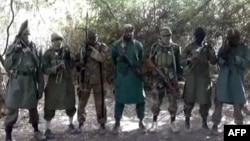ABUJA —
The youth wing of the Christian Association of Nigeria on Wednesday warned President Goodluck Jonathan against granting any kind of amnesty deal to the militant group known as Boko Haram, calling the proposition “a clarion call to all terrorism in Nigeria.”
In recent weeks, the clamor from leaders of Nigeria’s volatile north has grown loud. They want the president to mediate an amnesty deal with Boko Haram, a militant group some call “the Nigerian Taliban.”
Last week, President Jonathan announced he is forming a committee to look into the possibility. The youth wing of the Christian Association of Nigeria, an umbrella organization that represents several denominations, said even entertaining the possibility will “fuel the anger of the Christian youth.”
“Mr. President should remember that the amnesty being advocated is for Muslim youths who are the Boko Haram members and who have killed, maimed out fathers, mothers, sisters, brothers and children and also bombed and burnt our churches without provocation,” said Simon Dolly, the organization’s president.
In a thinly veiled warning, Dolly went on to say that young Christians have not responded to Boko Haram violence in kind because the Christian Association of Nigeria has forbidden it.
The Christian Association’s southeastern secretary, Christian Nwanya, says the only way to end the violence is by brute force. “Beef up security. They do not need amnesty. They should apologize for [to] Nigerians for killing us," she stated. "You can not forgive someone who kills you. It is not done anywhere.”
Violence associated with Boko Haram has killed more than 3,000 people since the insurgency began in 2009, including killings by security forces. Boko Haram has attacked government buildings, media houses, churches, security forces, communications infrastructure, and the local U.N. headquarters.
Northern leaders argue the regional economy could collapse under the strain of constant attacks, and it is the north that bears almost the entire effects of the insurgency.
In 2009, militants in the southern Niger Delta turned in their weapons and promised not to fight in exchange for job training and small salaries. Supporters of amnesty for Boko Haram point out that the Niger Delta amnesty quieted what was nearly an all-out war.
In recent weeks, the clamor from leaders of Nigeria’s volatile north has grown loud. They want the president to mediate an amnesty deal with Boko Haram, a militant group some call “the Nigerian Taliban.”
Last week, President Jonathan announced he is forming a committee to look into the possibility. The youth wing of the Christian Association of Nigeria, an umbrella organization that represents several denominations, said even entertaining the possibility will “fuel the anger of the Christian youth.”
“Mr. President should remember that the amnesty being advocated is for Muslim youths who are the Boko Haram members and who have killed, maimed out fathers, mothers, sisters, brothers and children and also bombed and burnt our churches without provocation,” said Simon Dolly, the organization’s president.
In a thinly veiled warning, Dolly went on to say that young Christians have not responded to Boko Haram violence in kind because the Christian Association of Nigeria has forbidden it.
The Christian Association’s southeastern secretary, Christian Nwanya, says the only way to end the violence is by brute force. “Beef up security. They do not need amnesty. They should apologize for [to] Nigerians for killing us," she stated. "You can not forgive someone who kills you. It is not done anywhere.”
Violence associated with Boko Haram has killed more than 3,000 people since the insurgency began in 2009, including killings by security forces. Boko Haram has attacked government buildings, media houses, churches, security forces, communications infrastructure, and the local U.N. headquarters.
Northern leaders argue the regional economy could collapse under the strain of constant attacks, and it is the north that bears almost the entire effects of the insurgency.
In 2009, militants in the southern Niger Delta turned in their weapons and promised not to fight in exchange for job training and small salaries. Supporters of amnesty for Boko Haram point out that the Niger Delta amnesty quieted what was nearly an all-out war.










